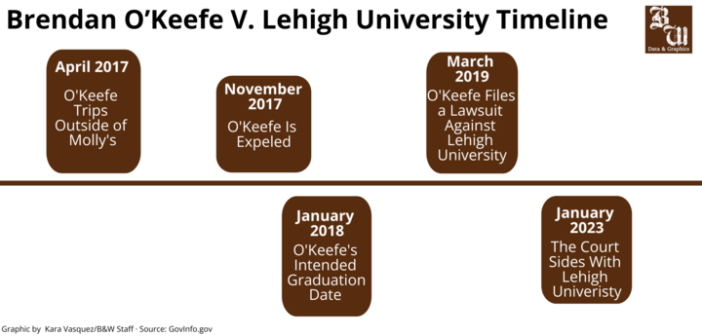In April 2017, former Lehigh student Brendan O’Keefe left Molly’s Sports Pub intoxicated and tripped on a nearby sidewalk. This incident led to his expulsion.
O’Keefe was expelled on Nov. 28, 2017, following a decision from the University Committee on Discipline.
Two years later, O’Keefe took Lehigh to court.
Lehigh Valley Live reported that he stated the university wrongfully terminated his education two months before graduation without sufficient evidence.
When O’Keefe was detained, his blood alcohol content was reportedly 0.34%, well over the threshold of legal intoxication in Pennsylvania.
According to court documents, O’Keefe claimed this number was not aligned with the number of drinks he had that night.
It takes about eight to 10 drinks for a 160-pound male to reach a blood alcohol content of 0.34%, according to PennDOT.
O’Keefe claimed he was assaulted by two officers at the scene who took his blood alcohol content with a breathalyzer test. The blood alcohol level they recorded usually indicates a total lack of awareness and over-intoxication.
In court, he argued that this level was incorrectly taken, as O’Keefe said he was conscious and able to stand.
In addition to this complaint, O’Keefe believed the internal analysis of the case broke a provision in Lehigh’s Student Code of Conduct regarding the “Respect for Self” clause.
According to Lehigh’s Alcohol Guidelines, the university expects community members to make responsible choices about consuming alcohol.
“The abuse and misuse of alcohol is incompatible with the aims of an academic community,” the guidelines read.
It also mentions that these guidelines are put into place to lower the university’s risk.
Lehigh claimed due to repeated violations of the Student Code of Conduct, including illegal drug use, underage drinking and academic dishonesty, the incident was O’Keefe’s final violation, resulting in his expulsion.
Christopher Mulvihill, associate dean of students, said if a student with a suspension on their disciplinary record returns and commits another serious violation, their behavior could lead to expulsion.
“Over the past 20 years, the most common reason for expulsion is serious academic dishonesty,” Mulvihill said. “A number of expulsions were based on past disciplinary records, as well.”
Lehigh provided multiple documents as evidence in O’Keefe’s case against the school, including low grades, which resulted in him being placed on probation.
Despite O’Keefe’s claims, the U.S. court of Appeals for the Third Circuit sided with Lehigh in a Jan. 12 decision, on appeal from the U.S. District Court of the Eastern District of Pennsylvania’s Jan. 9, 2023 decision.
Julie Wright, ‘26, a student senate member, said that students’ health and safety should be Lehigh’s highest priority.
She saw expulsion as an extreme response to an incident at an off-campus bar.
“The expulsion for a policy violation really calls into question if this is a measure that is designed to support student safety or rather punish a student for making a mistake,” Wright said.
Wright said the determinants for expulsion are subjective, but believes bias incidents need to be taken seriously, including racist and homophobic incidents, specifically relating to Title IX policies.
Local resident TJ Randolph said he supports Lehigh’s decision to expel O’Keefe. He believes expulsion is usually justified, as it is typically a result of multiple violations of policies or a large violation that cannot be looked past.
“Lehigh has to set a standard for all students and if this standard is broken repeatedly, all for different reasons, there is no incentive to follow it,” Randolph said. “I am always in support of following the rules, especially for higher education expectations, given the fact the student knew the rules when he enrolled here.”






Comment policy
Comments posted to The Brown and White website are reviewed by a moderator before being approved. Incendiary speech or harassing language, including comments targeted at individuals, may be deemed unacceptable and not published. Spam and other soliciting will also be declined.
The Brown and White also reserves the right to not publish entirely anonymous comments.